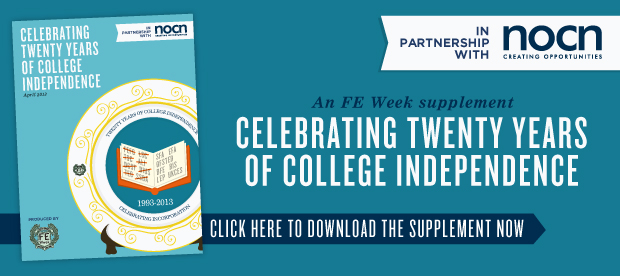It could have been yesterday with the chief inspector for colleges telling a small gathering: “From here on, satisfactory will be taken to mean unsatisfactory.”
The chief inspector in question was Terry Melia and it was the mid-90s. He was telling principals they had been getting off lightly in inspection reports since incorporation and it was time to toughen up.
The words may change, but not the meaning. So, as Matthew Coffey, Ofsted director for learning and skills, carries out the latest changes to the inspection regime (where “satisfactory” is replaced by the warning that you “require improvement”) he makes no apologies.
And with chief inspector Sir Michael Wilshaw having been strongly critical of colleges in his annual report last year, Coffey added: “We said the same thing, but the message may have been more softly spoken last year.”
“When you spend public money on inspection and the wake-up call doesn’t reach home, you purposefully ramp up the language. If some get a little defensive then so be it.”
The recent survey report Local Accountability and Autonomy in Colleges — on how well colleges were using new freedoms and flexibilities to rethink priorities and develop their curriculum to meet local community needs — showed “only three out of 17 colleges visited had changed their curriculum in any way at all.”
At this point, comparison with immediate post-Incorporation years ends.
Coffey makes it clear his aim is to reach and change the hearts and minds of governors, to raise their game and get them to put more pressure on directors and senior managers.
“In colleges judged to require improvement, an individual HMI [not those who did the inspection] works with the institution to help them improve, to get to ‘good’,” he says.
The new Ofsted role under the remit of New Challenges; New Chances is to be “challenging and supporting,” says Coffey.
Intervention is not just aimed at the principal or senior teachers, but “where impact is best received”, he adds, “which is as likely to be the governors”.
Many inspectors are seen to have little experience of colleges”
Coupled with the intervention is a range of regional workshops and other activities designed to support specific groups — maybe governors — and get them to share good practice. The “national dashboard” was devised to help boil data down to a single overview so governors could challenge directors and ask questions such as: “Why has the curriculum not changed to meet these needs?” and “Why have we seen no improvement around NEETs?”
Reactions to the changes are mixed. The 157 Group welcomed the emphasis on teaching and learning in the report and acknowledged the need to halt the increase in underperforming colleges. However, Marilyn Hawkins, chair of the 157 Group and principal of Barnet and Southgate College, said: “The rise in numbers of colleges judged inadequate is undoubtedly due in part to the fact that Ofsted inspection is focused on those deemed to be most at risk.”
Principals who spoke to FE Week varied widely in their views. Many saw real strengths in the focus on teaching and learning, follow-up support for colleges requiring improvement and comprehensive presentation of reports and data. Some said lead inspectors were good, wrote clear and helpful reports and, overall, were probably “accurate, fair and robust”.
Equally, others saw weaknesses. One senior manager spoke of inspectors coming in with an attitude of “papal-like infallibility and arrogance”. Many had considerable concerns that Ofsted did not inspect most of what colleges do (such as HE) but presumed to give a grade for the whole college. Many inspectors are seen to have little experience of colleges.
But the overall view was that things were going in the right direction. Besides, things are unlikely to change anytime soon, as Coffey says: “The freedoms New Challenges; New Chances offer are welcomed and perhaps long overdue, but that has not gone hand-in-hand with the development of key figures such as governors.”


Your thoughts